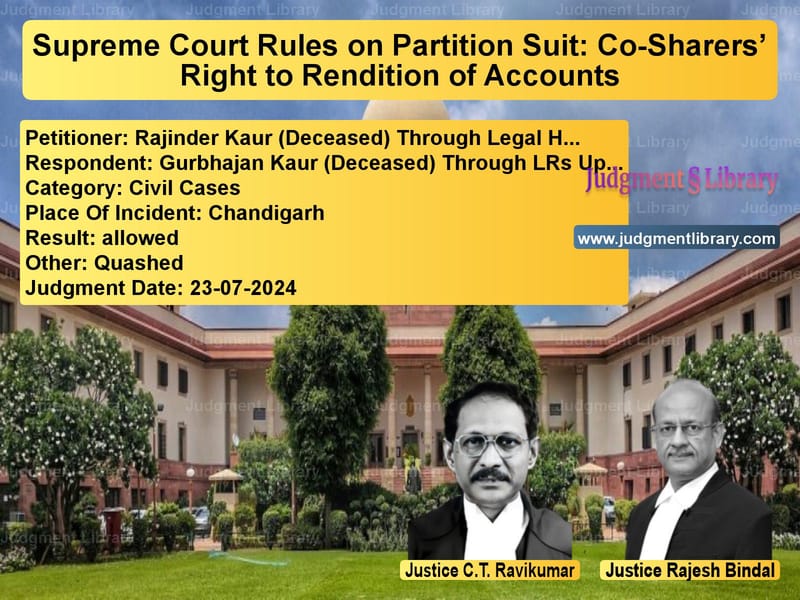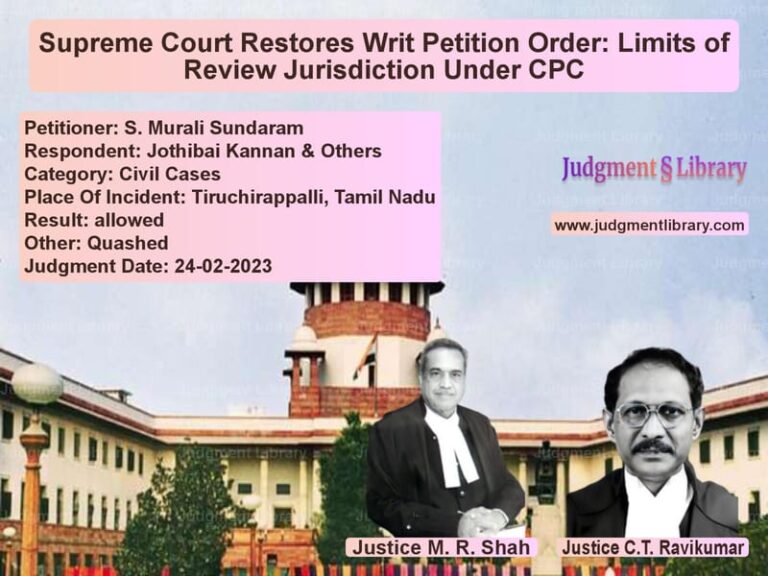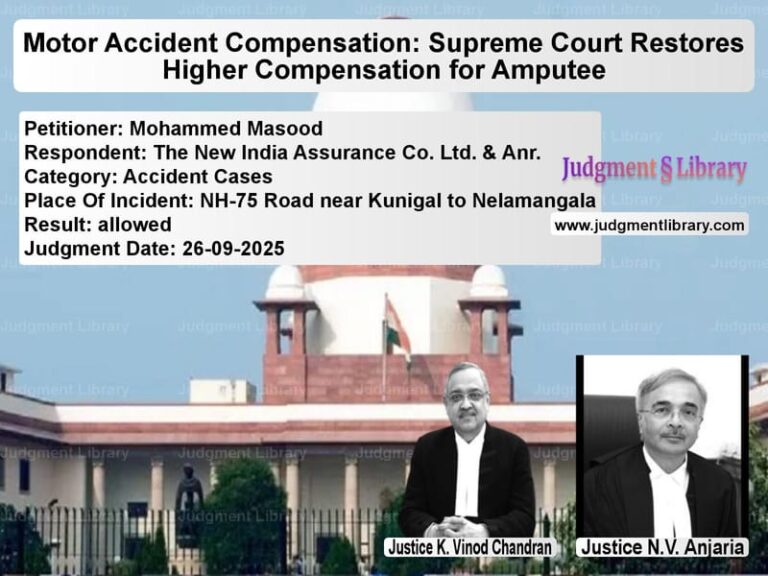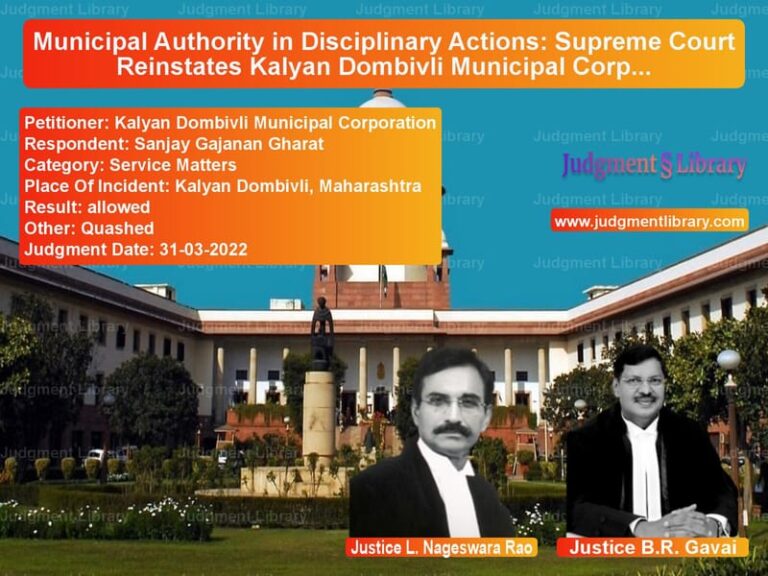Supreme Court Rules on Partition Suit: Co-Sharers’ Right to Rendition of Accounts
The Supreme Court of India has delivered a significant judgment in Rajinder Kaur (Deceased) Through Legal Heir Usha vs. Gurbhajan Kaur (Deceased) Through LRs Upinder Kaur & Ors., clarifying the rights of co-sharers in a partition suit, the obligation to render accounts, and the legal principles surrounding joint ownership disputes. The ruling addresses the issue of partition by metes and bounds, the sale of property by auction, and the liability of certain co-sharers to contribute to the common pool.
Background of the Case
The dispute originated from a civil suit for partition filed by Rajinder Kaur, seeking division of a jointly owned property. The suit property was owned by multiple parties, including tenants and subsequent buyers who purchased shares during the litigation. The plaintiff sought a preliminary decree for partition, directing an open auction sale if division was not feasible. Additionally, the suit demanded rent payments from certain defendants who were collecting rent from tenants and sought mesne profits from those in occupation beyond their rightful share.
Key Legal Issues Before the Supreme Court
- Whether partition by metes and bounds was possible under the Chandigarh (Sale of Sites and Buildings) Rules, 1960.
- Whether the property should be sold via open auction.
- Whether certain co-sharers were liable to render accounts for the rent collected and profits earned.
- Whether those in possession of a larger portion than their legal share should contribute to the common fund.
Petitioner’s Arguments
The appellant argued:
- That the suit property could not be partitioned physically due to legal restrictions under the 1960 Rules.
- The only solution was to sell the property via open auction, with proceeds distributed among co-sharers.
- Defendant No.3(a), who purchased 1% share but occupied a substantial portion, should render accounts for rent collected.
- Defendant Nos.15 to 19, who held 15% ownership but were using more than their fair share for business purposes, should also contribute to the common fund.
Respondent’s Arguments
The respondents countered:
- That they were in possession of areas equivalent to their shares and should not be liable for additional payments.
- That no relief for rendition of accounts was originally sought against Defendant Nos.15 to 19.
- That Defendant No.3(a) had not rented out the property and should not be required to contribute beyond his 1% ownership.
Supreme Court’s Observations
1. Partition by Metes and Bounds
The Court held that under the Resident’s Welfare Association vs. Union Territory of Chandigarh ruling, partition by metes and bounds was not feasible in Chandigarh. Thus, the only legal recourse was selling the property via open auction.
2. Obligation to Render Accounts
The Court ruled that Defendant No.3(a) and Defendant Nos.15 to 19 were liable to render accounts. It noted that:
- Defendant No.3(a) had earlier claimed to have rented out portions but later denied receiving rent.
- A trial court-appointed receiver found that alleged tenants were not occupying the premises, raising doubts about the validity of Defendant No.3(a)’s claims.
- Defendant Nos.15 to 19 were using the property for their business, and if they were occupying more than their rightful share, they must contribute proportionately.
3. Principles of Equitable Distribution
The Court observed that the proceeds from the auction must be fairly distributed. If Defendant Nos.15 to 19 occupied more than their share, they should either contribute to the common fund or forego a portion of the auction proceeds.
4. Liability of Co-Sharers
The Court set out a framework for determining liability:
- If co-sharers occupy areas equal to their share, they need not contribute.
- If they occupy more, they must either pay rent into the common fund or accept a reduced share from the sale proceeds.
Final Judgment
The Supreme Court ruled:
- The property must be sold by auction, and the proceeds distributed among co-sharers.
- Defendant No.3(a) must render accounts and pay a reasonable amount for occupying the property.
- Defendant Nos.15 to 19 must either contribute to the common fund or adjust their entitlement accordingly.
- The trial court was directed to expedite final decree proceedings within nine months.
Implications of the Judgment
This ruling clarifies the rights and responsibilities of co-sharers in partition suits, ensuring fair distribution of property or proceeds. It also reinforces the principle that those benefiting from joint property beyond their rightful share must compensate other co-sharers accordingly.
Petitioner Name: Rajinder Kaur (Deceased) Through Legal Heir Usha.Respondent Name: Gurbhajan Kaur (Deceased) Through LRs Upinder Kaur & Ors..Judgment By: Justice C.T. Ravikumar, Justice Rajesh Bindal.Place Of Incident: Chandigarh.Judgment Date: 23-07-2024.
Don’t miss out on the full details! Download the complete judgment in PDF format below and gain valuable insights instantly!
Download Judgment: rajinder-kaur-(decea-vs-gurbhajan-kaur-(dece-supreme-court-of-india-judgment-dated-23-07-2024.pdf
Directly Download Judgment: Directly download this Judgment
See all petitions in Property Disputes
See all petitions in Landlord-Tenant Disputes
See all petitions in Contract Disputes
See all petitions in Damages and Compensation
See all petitions in Specific Performance
See all petitions in Judgment by C.T. Ravikumar
See all petitions in Judgment by Rajesh Bindal
See all petitions in allowed
See all petitions in Quashed
See all petitions in supreme court of India judgments July 2024
See all petitions in 2024 judgments
See all posts in Civil Cases Category
See all allowed petitions in Civil Cases Category
See all Dismissed petitions in Civil Cases Category
See all partially allowed petitions in Civil Cases Category







